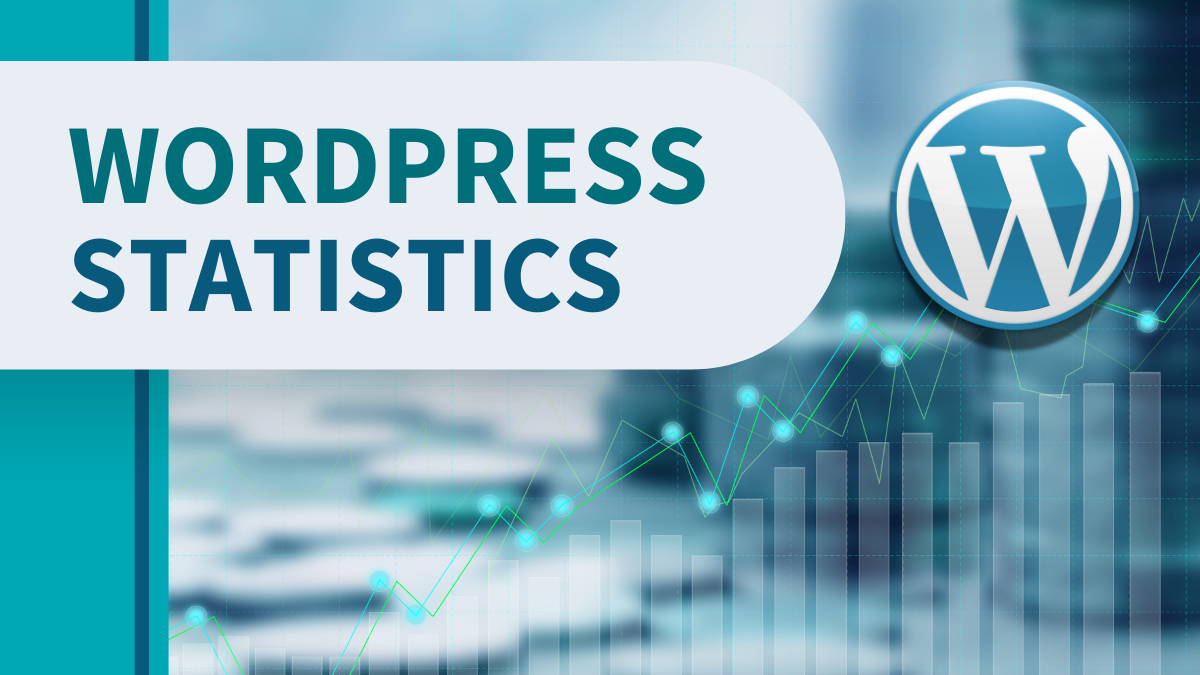WordPress has established itself as the premier choice for anyone looking to create a website. As of 2025, the number of WordPress websites has soared to a remarkable 861 million. This figure was arrived at by comparing the percentage of WordPress users to the total number of websites worldwide.
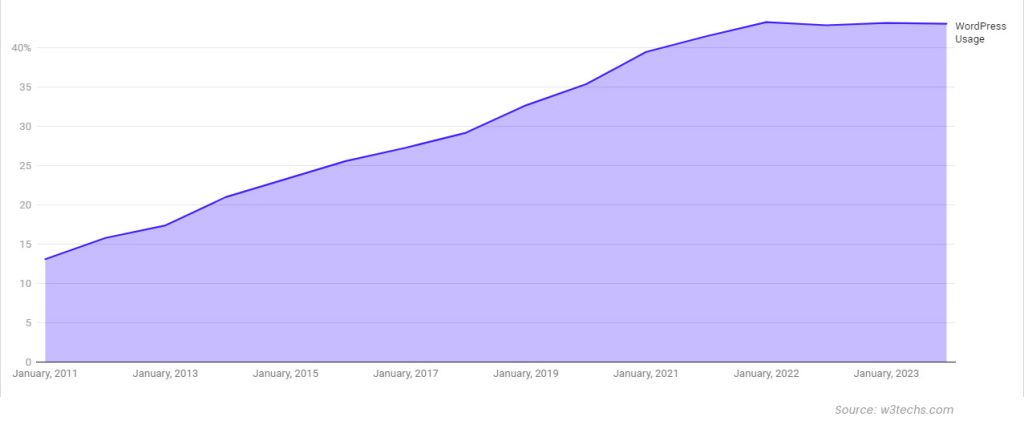
An impressive 14.7% of the world’s top websites rely on WordPress. Prominent organizations such as the NFL, NBC, and CNN represent just a small portion of the Fortune 500 companies that have selected WordPress as their preferred content management system (CMS).
Let’s delve into the significant WordPress statistics.
How Did It All Start?
WordPress’s journey began in 2001, initially named WordPress 0.5 or B2/Cafelog. In 2003, Matt Mullenweg took over as the primary programmer, leading to the release of WordPress 0.7 that same year.
By July 2011, WordPress was powering over 50 million blogs. In 2013, it captured a 59% market share in the Content Management Systems (CMS) sector, making it the most popular CMS around the globe.
An interesting tidbit is that the name “WordPress” was proposed by Christine Selleck Tremoulet, a friend of Matt Mullenweg.
Web designers increasingly prefer WordPress as their platform of choice due to its flexibility, extensive customization options, and user-friendly interface for creating diverse and dynamic websites.
How Popular Is WordPress?
As of 2025, WordPress accounts for 43.1% of the internet, with an average of 661 new WordPress sites being created daily. This consistent growth underscores the platform’s expanding influence and popularity.
In the realm of high-traffic sites, WordPress commands a significant 30% share among the top 10 million websites worldwide. Remarkably, it powers 14.73% of the world’s top 100 websites, highlighting its widespread adoption by major organizations.
The WordPress Plugins directory, with its expansive collection of over 60,000 plugins, emphasizes the platform’s remarkable capacity for customization, catering to a diverse range of needs and preferences.
Looking forward to 2025, projections indicate that WordPress will continue to lead the market with a 62.6% share among websites utilizing content management systems (CMS). This represents an increase of over 10% compared to previous years. As early as 2010, WordPress was the preferred platform for more than half (51%) of websites.
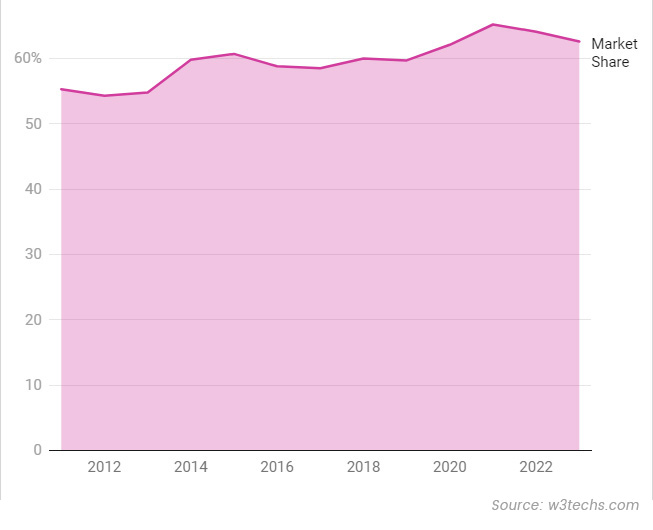
A notable shift occurred in 2016 when WordPress usage slightly declined, coinciding with the rise of Joomla as a competitive CMS option, which secured a 3.3% market share.
Also Read: How To Setup Google Analytics 4 For Your WordPress Website
WordPress Usage
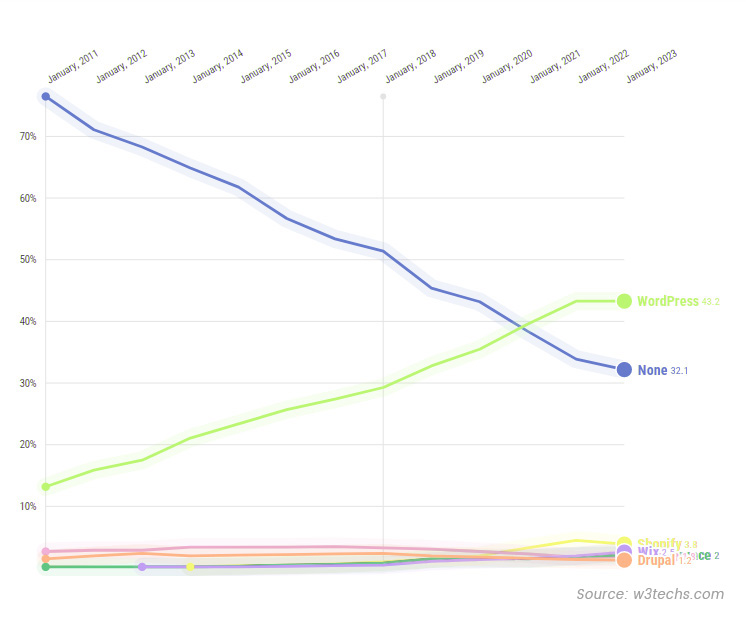
WordPress’s growth trajectory is particularly impressive given the decline of other custom content management systems. Despite minor shifts in the popularity of alternative CMS platforms, WordPress remains a top choice due to its user-friendly interface and accessibility.
The affordability of WordPress is a significant draw for many users. Hosting a basic WordPress site can cost as little as $60 per year, plus approximately $10 for a domain name. However, these expenses can increase for more sophisticated, professional websites.
A standout feature of WordPress is its availability in an impressive 208 languages. Of these, 52 languages have translations that are more than 50% complete, while others are still in the initial stages of translation.
Let’s now examine the top 10 languages in which WordPress is most commonly used:
- English (US) – 44.3%
- Spanish (Spain) – 5.8%
- German – 5.7%
- Japanese – 5.9%
- French – 4.4%
- English (UK) – 3.5%
- Italian – 3.1%
- Russian – 2.5%
- Portuguese (Brazil) – 3.1%
- Polish – 2%
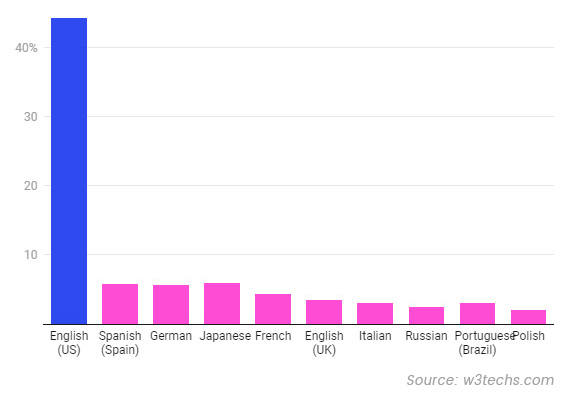
What About WordPress.com?
WordPress.com remains a major online destination, attracting a staggering 409 million visitors each month. This significant traffic results in over 20 billion page views, highlighting the platform’s extensive global reach and popularity.
Each month, approximately 70 million new posts are published on WordPress.com, contributing to its dynamic and evolving content landscape. The continuous addition of diverse and fresh content not only underscores the platform’s vitality but also reflects the wide array of interests and perspectives of its user base.
Moreover, user engagement on WordPress.com is highly active, with around 77 million comments posted on articles each month. This level of interaction demonstrates the vibrant and engaged nature of the WordPress.com community, where users actively engage in discussions, exchange insights, and foster connections through their conversations.
WordPress And SEO
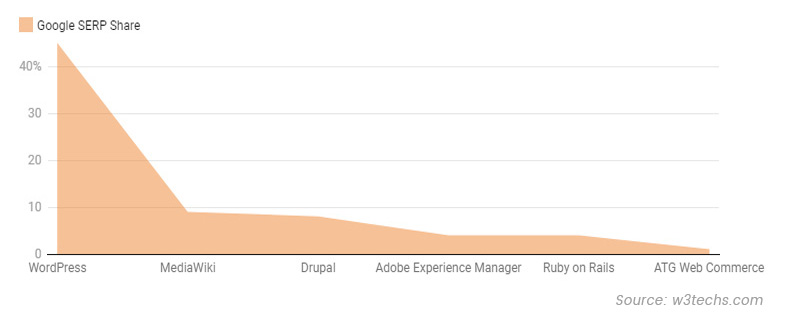
WordPress excels as a content management system (CMS) for optimizing website search engine performance. Key features include:
- Prioritizing User Experience: WordPress prioritizes a seamless and intuitive user experience.
- Custom Permalinks: It offers the flexibility to create custom permalinks that align with your content.
- Simple Metadata Management: Manage metadata effortlessly, aiding your SEO efforts.
- Effortless Image Optimization: Optimize images easily, enhancing SEO performance.
- Speedy Load Time: WordPress sites are known for their quick loading, a vital aspect of SEO.
- Mobile Optimization: With 58.99% of web traffic coming from mobile devices in 2022, WordPress is fully optimized for mobile users.
- SEO-Optimized Plugins: A wide range of plugins are available to bolster SEO tactics.
- Seamless Software Integration: WordPress integrates smoothly with various software tools, enhancing functionality.
- SEO-Friendly Themes: A variety of themes are designed to be SEO-friendly.
- Social Media Integration: Easily link your content with social media platforms to broaden your online reach.
As an SEO agency, we highly endorse WordPress as the premier CMS choice. It is the preferred platform for our partners, laying a solid foundation for executing effective WordPress SEO strategies.
WordPress Versions
WordPress 6.4 has been downloaded over 76 million times, a figure that continues to increase steadily. Typically, newer versions of WordPress outperform their predecessors in terms of usage, leading to a significant disparity in the adoption rates between older and more recent versions.
A unique aspect of WordPress is its tradition of naming versions after jazz musicians, a practice that began with version 1.0, named ‘Davis’ in tribute to Miles Davis. This tradition has continued, honoring jazz greats like Billie Holiday, Ella Fitzgerald, James Smith, and Nathaniel Adderley. The latest version, WordPress 6.4, is named ‘Shirley’ in honor of the renowned jazz artist Shirley Horn.
An interesting point of discussion is identifying which WordPress version is the most popular among users of the platform.
| Version | Usage |
| Version 6 | 62.30% |
| Version 5 | 30.50% |
| Version 4 | 6.70% |
| Version 3 | 0.40% |
| Version 2 | Less than 0.1% |
WordPress Plugins
The WordPress plugin repository boasts a staggering collection of over 60,000 plugins, which collectively have surpassed one billion downloads. The growing popularity of these plugins can be attributed to technological advancements and the wide variety of options available in the market.
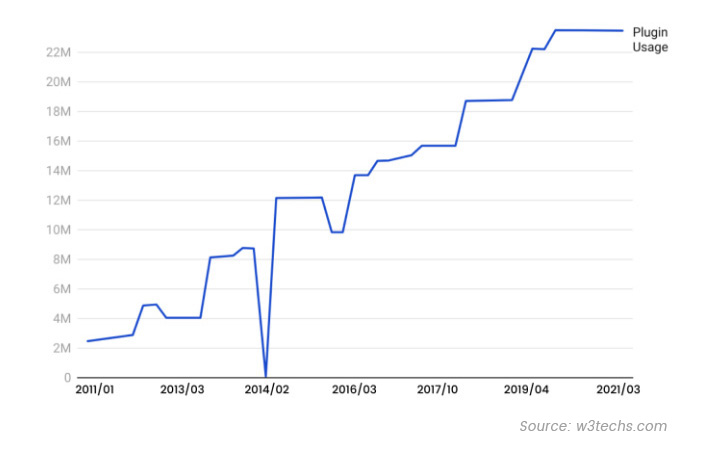
Let’s delve into some of the key plugins:
WooCommerce is the leading plugin, with a usage rate of 68%. It has been downloaded more than 229 million times and is actively used on approximately 6.9 million websites. Supporting an impressive 67 languages, WooCommerce outperforms competitors like Magento (30 languages) and Shopify (20 languages). Its dominance is clear, as it powers 28% of all online retail sites and an astounding 93.7% of WordPress-based eCommerce websites.
Gutenberg is another prominent plugin, with around 79.6 million active installations. The platform accounts for approximately 284.2 million posts, including those created using Jetpack. This figure also reflects whether the post was made using the Gutenberg editor.
Akismet stands out among WordPress plugins for its dedicated focus on combating spam comments. With an impressive tally of 133 million downloads, this plugin has proven its efficacy in spam protection, successfully blocking over 500 billion spam messages. This translates to an average of about 7.5 million spam messages thwarted per hour, illustrating its vital role in maintaining the integrity of WordPress sites.
Most Popular WordPress Plugins By Active Installations
SEO plugins:
- Yoast SEO: Over 5 million installations
- All In One SEO Pack: Over 2 million installations
- RankMath: Over 800,000 installations
Speed plugins:
- JetPack: Over 5 million installations
- WP-Optimize: Over 1 million installations
- NitroPack: Over 60,000 installations
Page builders:
- Elementor: Over 5 million installations
- SiteOrigin Builder: Over 1 million installations
- Beaver Builder: Over 300,000 installations
Contact form plugins:
- Contact Form 7: Over 5 million installations
- WP Forms: Over 4 million installations
- Ninja Forms: Over 1 million installations
Security plugins:
- Wordfence Security: Over 4 million installations
- iThemes Security: Over 1 million installations
- Sucuri Security: Over 800,000 installations
Backup plugins:
- UpdraftPlus: Over 3 million installations
- BackWPup: Over 700,000 installations
- VaultPress (Jetpack Backup): Over 60,000 installations
WordPress Themes
The selection and implementation of themes are pivotal in defining the aesthetic and functional aspects of WordPress websites. WordPress itself offers an extensive range of over 8,000 free themes, accommodating a wide variety of design preferences and requirements. Moreover, Themeforest, recognized as one of the largest marketplaces for WordPress themes, features a remarkable collection of over 51,000 themes for purchase.
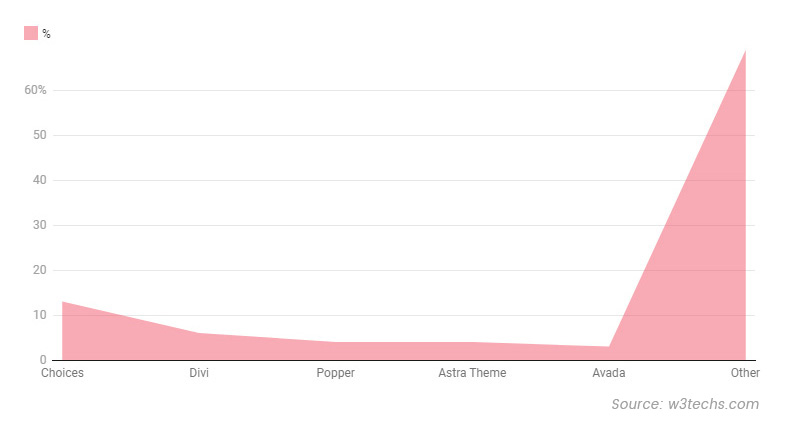
In total, the WordPress ecosystem boasts 31,010 themes, with an average price point of $77.57 per theme. This impressive array results from the collective contributions of 221 theme companies, each bringing their unique design perspectives and innovations to the table.
Among this vast array, certain themes have risen to prominence. Popular choices include Divi, Popper, Astra Theme, and Avada, with Avada in particular achieving significant success. Avada alone has sold over 675,000 copies at $60 each, highlighting its strong reputation and popularity within the WordPress community.
WordPress Security
Securing WordPress websites is of paramount importance. On average, WordPress sites face around 90,000 attacks every minute. Plugins often become the primary vulnerability, accounting for more than half of the points of entry for these attacks. To mitigate these risks, it’s recommended to download plugins only from trusted sources, avoid using abandoned plugins, and immediately report any security breaches to the provider.
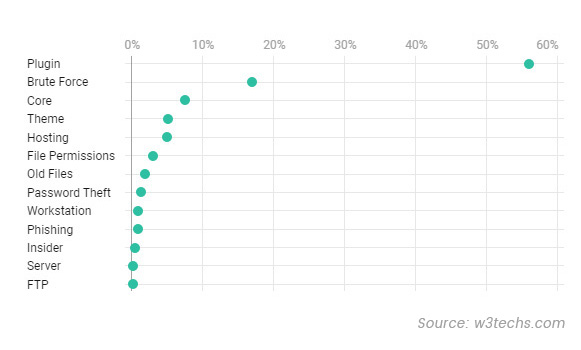
Other significant security concerns include brute force attacks, constituting 16.1% of vulnerabilities. The WordPress core, themes, and hosting services collectively represent less than 10% of the security issues.
What Is the Earning Potential of Individuals Using WordPress?
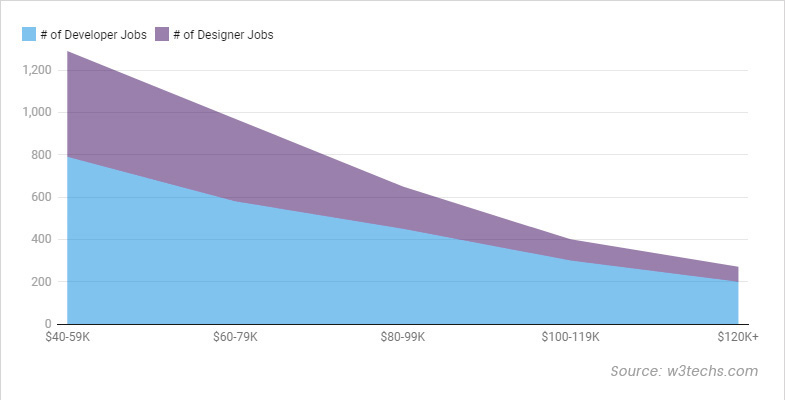
Pursuing a career as a WordPress developer or designer is generally straightforward, and these roles often offer competitive salaries. In the U.S. freelancing market for WordPress-related jobs, 32% of professionals charge an hourly rate between $10 to $19, while another 28% set their rates in the $20 to $29 range.
Conclusion
Delving into WordPress statistics and facts reveals a dynamic and influential ecosystem that has significantly impacted website development and content management. With its considerable market share, a vast array of plugins and themes, and a diverse, global user base, WordPress is a major player in the digital arena. Its adaptability, user-friendly interface, and ongoing innovation contribute to its widespread use by individuals, businesses, and organizations.
Exploring WordPress statistics isn’t just about the numbers; it highlights a platform that fosters creativity, drives innovation, and remains integral to the online experiences of millions globally. WordPress’s sustained growth and flexibility emphasize its lasting significance in the constantly changing digital landscape.
FAQs
What is the difference between WordPress.com and WordPress.org?
WordPress.com functions as a hosting service, managing the technical aspects while you build your site on WordPress. Conversely, WordPress.org provides the software for you to download and install on your own server or hosting platform, offering more autonomy and control.
What is the most popular WordPress theme?
The popularity of WordPress themes fluctuates, but as of the latest update, Astra, GeneratePress, and OceanWP are among the top choices. Popularity varies based on user preferences and current trends.
What is Gutenberg in WordPress?
Gutenberg is the block editor introduced in WordPress 5.0, transforming content creation with a block-based approach. It enables users to craft rich, dynamic content by adding and arranging a variety of content blocks.
Is WordPress SEO-friendly?
Yes, WordPress is renowned for its SEO-friendliness. Its structure, coupled with numerous SEO plugins, facilitates easy optimization of content for search engines. Popular SEO plugins like Yoast SEO and All in One SEO Pack are extensively used.
